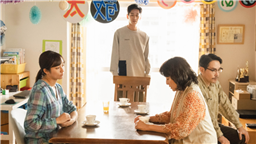Fukada Koji Talks Venice Competition Film ‘Love Life,’ Loneliness and Bitter Little Ironies

The titles of Fukada Koji’s films almost drip with bitter irony. “Sayonara” seemed to be a farewell to human actors. Instead of being harmonious, Cannes Un Certain Regard jury prize-winner “Harmonium” was pitch black and steeped in quiet violence.
Fukada’s latest, Venice Film Festival competition title carries the moniker “Love Life.” But its subject matter is loneliness.
The story starts out on familiar lines, involving a married couple where suddenly the ex-husband of the wife appears, potentially setting up the melodrama of a triangular relationship. But in Fukada’s hands things are colder and more painful. The newcomer is burdensome, deaf and homeless. His arrival triggers, not love, but fragmentation, individualism and loneliness.
“We come into life alone and we die alone. Along the way, we try to forget about this loneliness by having families, taking lovers or sometimes even having religion. But loneliness is at the core of humanity,” Fukada tells Variety.
“We use processes to help us forget. But, sometimes, events happen that remind us of our loneliness.”
Fukada explains that some intrusions may have inherent meaning – as in the sudden arrival of Asano Tadanobu’s character Yasaka in “Harmonium” – but others such as a natural disaster or a car crash have no intrinsic value. Instead, like the arrival of Park in “Love Life,” they are disruptors important for the responses that they provoke.
“Love Life” shares other connections with “Harmonium.” Inspiration for both films occurred some twenty years ago, around the time that Fukada was a splitting his time between a history degree and film studies at night school and jobbing as an actor.
The idea for the film came from a song by jazz musician Yano Akiko and Fukada quickly saw its potential. “The synopsis that I wrote twenty years ago, was very, very short. When I started to develop the actual scenario, more recently, it only took me two to three years.”
The intervening period has been spent busily developing a large body of work – features, shorts and animation – that the Tokyo International Film Festival deemed worthy of a retrospective by the time Fukada hit the ripe old age of 40. He also keeps up the acting.
“With the future ahead of us so difficult to predict, now is the time to be in touch with films that meticulously capture the world,” said Kohei Ando, Tokyo festival programming advisor, explaining the 2020 showcase.
In that spirit, Fukada has come to embody the 21st century Japanese spirit of French new wave director Eric Rohmer. Fukada encourages naturalistic performances, narrative ambiguity and a dash of suffering. Happiness has to be earned.
“Eric Rohmer is a director that I absolutely love. There is sometimes always some part that is inspired by him. And even when I’m busy shooting a movie I will always view some scenes from Rohmer’s movies, so that they will transpire in my process,” Fukada says.
Among the upcoming projects that Fukada hopes to shoot next year is “Love on Trial,” in which a female performer comes under pressure for having a boyfriend, something that is in breach of her strict agency contract. The subject has contemporary resonance in a patriarchal Japanese entertainment industry, which is now beginning to experience its own #MeToo backlash.
“We are talking about the whole business that revolves around Japanese idols, and how they can be exploited, even sexually,” says Fukada. But he is at pains to distance the project (previously presented at the Rotterdam CineMart) from his own direct experiences of exploitation.
Away from the camera, Fukada has become an active campaigner for economic and social justice within the film industry.
“People from the U.S. or Europe do not realize how archaic the situation of Japanese women in the entertainment industry can be. Compared to France or Korea, I think that Japan is maybe twenty or thirty years behind,” Fukada says.
He is campaigning too for the establishment of a body that he likens to France’s CNC or Korea’s KOFIC that regulates the sector, redistributes income back into filmmaking and ensures the kind of equity that nurtures creativity.
“In Japan, we already have a low cultural budget. But in addition to that, we don’t even have a system. Money doesn’t circulate at all well.” Fukada is not bitter, rather he is determined to earn his happiness.
Read More About:
Source: Read Full Article